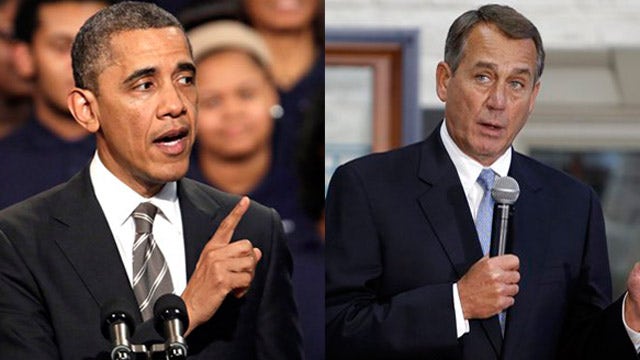Sequester blame game, hysteria as deadline approaches
Congressional Republicans led by House Speaker Boehner have one message for Pres. Obama: You created the spending crisis, so fix it
House Speaker John Boehner had a simple message Wednesday for President Obama after he used the bully pulpit to blame Republicans for the "meat cleaver" of looming spending cuts: You created it, you fix it.
"Having first proposed and demanded the sequester, it would make sense that the president lead the effort to replace it," Boehner wrote in a Wall Street Journal op-ed.
The "sequester" is the Washington word for the $85 billion in 2013 spending cuts set to hit starting March 1, with more than $1 trillion in cuts on tap over the next decade. Boehner and Obama both agree that the federal budget needs that level of deficit reduction and more, but sharply disagree over how to achieve it. In the absence of any compromise, the set of indiscriminate cuts which would hit the military hardest are set to take hold in less than two weeks.
The president on Tuesday, surrounded by first responders who are among those who would see cutbacks, called on House Republicans to drop their resistance to tax increases and steer the country away from the budget "meat cleaver."
But Boehner reminded Obama that the automatic cut idea was originally proffered by the White House during the debt-ceiling talks of 2011. He said Congress "reluctantly accepted the president's demand" and claimed it's now up to Obama to find the escape hatch.
"So, as the president's outrage about the sequester grows in coming days, Republicans have a simple response: Mr. President, we agree that your sequester is bad policy. What spending are you willing to cut to replace it?" Boehner asked.
White House Communications Director Dan Pfeiffer rejected what he described as "revisionist history." The White House acknowledges the "sequester" came from their office, but argues that Congress was on board at the time. The original plan was to tee up cuts so Draconian that Congress would be compelled to strike a deal to replace them -- Congress, though, failed to do so.
While Boehner blames Democratic resistance to spending and entitlement cuts, Obama blames GOP resistance to closing tax loopholes.
"(Obama) is willing to make tough choices. Now it's time for the speaker to do the same. The speaker has yet to name one tax loophole he's willing to close. Not one," Pfeiffer said.
White House Press Secretary Jay Carney also said Tuesday that Congress "must act" to avert the spending cuts, putting the onus on congressional Republicans. "It is bad policy," he said.
The back-and-forth was further evidence that the two sides are drifting further apart as the deadline nears, and that chances of a deal in the near-term are fading.
The president spoke Tuesday at the White House, urging Congress to come up with a short-term fix to cancel sweeping cuts to defense and other programs set to hit March 1.
"These cuts are not smart. They are not fair. They will hurt our economy. They will add hundreds of thousands of Americans to the unemployment rolls," Obama said. "This is not an abstraction -- people will lose their jobs."
The president ticked off a host of expected repercussions should the $85 billion in cuts for this year take effect. He said Border Patrol, emergency responders, FBI agents, airport controllers and others would all face cutbacks. He said teachers would be laid off by the thousands and America's military would be degraded.
But Congress is out for the week, effectively leaving one more workweek to reach a deal, or a stopgap, before the deadline.
Shortly before he spoke, Obama was also dealt a blunt warning by former Republican Sen. Alan Simpson, who co-chaired the president's deficit-reduction commission.
Simpson warned that Obama "will have a failed presidency" unless he deals "honestly" with entitlements, saying programs like Medicare and Social Security must be dealt with in order to get the country on a sustainable path.
"If he wants to leave it alone and not deal with those two biggies, forget the rest of the stuff -- he'll have a failed presidency," Simpson told Fox News.
While Obama says opposition to tax hikes is holding up a deal, Republicans say Democrats' resistance to major changes to entitlements are a big part of the problem.
Simpson and Erskine Bowles, the former co-chairmen of the president's deficit-reduction commission who for years have been urging Washington to stop kicking the can, got in front of the president early Tuesday morning to push a plan of their own.
The two fiscal hawks pitched a plan to avert the looming spending cuts -- heavy cuts to defense and other programs that they describe as "abrupt" and "mindless" -- and instead enact a $2.4 trillion deficit reduction plan over 10 years.
A quarter would come from changes to health care spending, a quarter would come from closing tax loopholes and the rest would come from spending reductions including a stingier adjustment of Social Security's cost of living increases.
On tax reform, the plan presents a middle ground -- by using the savings from closing loopholes to both lower rates and bring down the deficit. By contrast, Obama has pushed to use that savings mostly to reduce the deficit, while Republicans have pushed to use it to bring down rates.













































